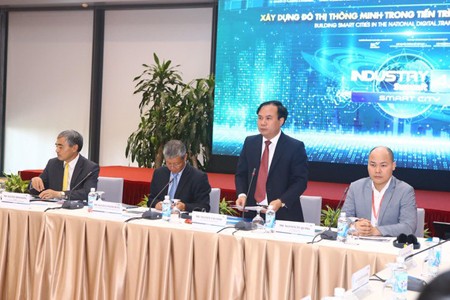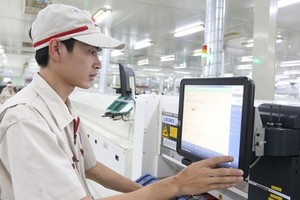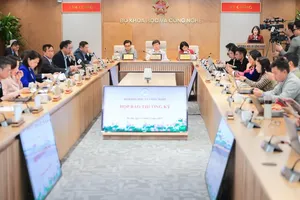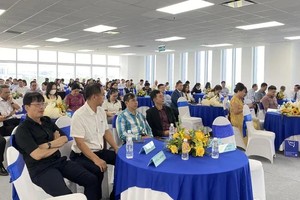
The summit is to evaluate the current status of Vietnam when taking part in Industry 4.0, introduce the newest policies and guidelines of the Central Party and the Government, offer opportunities to apply Industry 4.0 results into various activities nationwide.
The international exhibition in this event presents the latest socio-economic achievements of Vietnam and connects domestic businesses to global investors.
The summit, formally launched this morning, is expected to welcome around 1.500 representatives from all regions in the country as well as international delegates.
In the afternoon of October 2, there were 5 seminars, 1 exhibition on modern technologies, and an investment connection session happening. They focused mostly on smart bank, smart city, smart production, smart energy, and digital economy.
Notably, in the seminar ‘Building Smart Cities in the National Digital Transformation Process’, chaired by the Central Party Economic Commission and held by the Ministry of Information & Communications, several proposals on constructing a smart city was raised, since this new structure will be a driving force for national socio-economic growth.
Reports from this seminar revealed that at the moment, Vietnam has more than 830 cities of all scales with an urbanization rate of 38.6 percent. The economic growth in urban areas reaches 12 – 15 percent on average, 1.5 to 2 times as high as the national one. There are around 30 areas nationwide implementing their project of transforming into a smart city, including Ho Chi Minh City (HCMC).
However, evaluations from the Ministry of Information and Communications displays many inadequacies. This is because some areas have just begun the use of basic applications or services for a smart city. Meanwhile, related ministries and industries are still researching and preparing suitable guidelines on proper policies and mechanisms for this city structure.
Therefore, in the seminar, Deputy Minister of Information and Communications Nguyen Thanh Hung warned that the local authorities should obtain appropriate awareness about the process of transforming a city into a smart one, avoiding overly wide investment and imitation at all cost.
While carrying out this special project, each city has to adjust their own needs based on a common platform, database, operation and monitoring in order to ensure investment effectiveness. The forming of a smart city must closely link to the development of an e-government, stated Deputy Minister Hung.
Cyber security should be prioritized right at the initial stage, added the Deputy Minister. He suggested to carefully choose a capable business to implement the project and pay much attention to the development of suitable human resources, both in management level and regular one.
Adding to these recommendations, Deputy Minister of Construction Nguyen Van Sinh said that the construction of a smart city should put citizens in the center so that all classes are able to enjoy corresponding benefits. He also mentioned the necessity to protect sensitive information of the public.
























